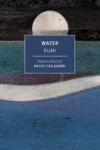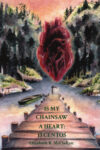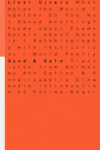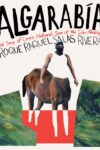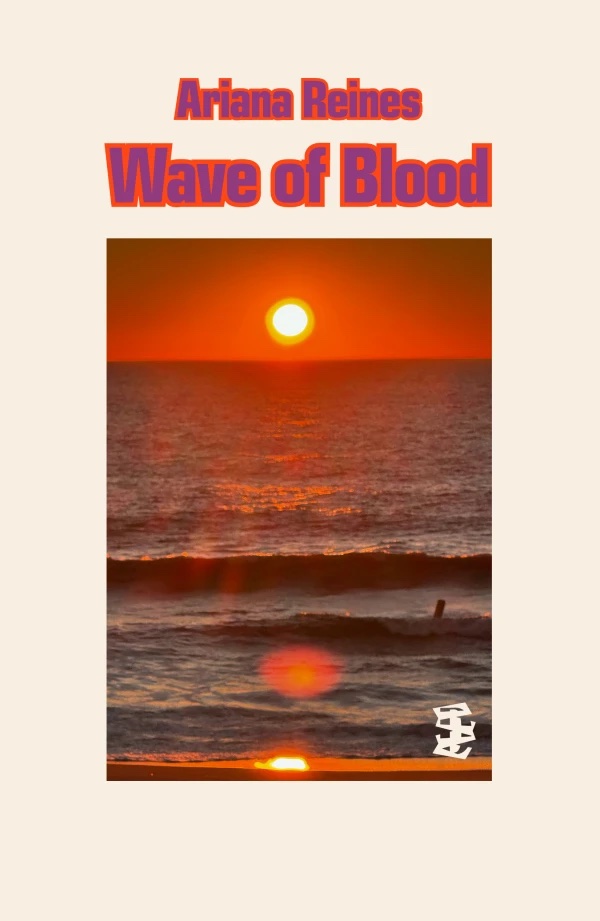
[Divided Publishing; 2025]
“I think proximity is the abyss
between God and us because /
every fabric of my body is trying
to know why”
– Fanny Howe, “On the Ground”
“I was conscious of my body sleeping in a rented bed,” writes Ariana Reines in her new book Wave of Blood (Divided Publishing, 2025, not to be confused with her other new book, The Rose (Graywolf, 2025)). “[F]ar from the atrocity. The atrocity went on in my body, around which no human being encircled their arms.” In crisis response, which comes after atrocity (after its beginning, at least), we are taught (I was taught) to listen, and that the first time a person says what happened, they must be held and believed. But this is not what Reines is asking the reader to do, because there is no doubt about the waves of horror (no repetition, as Gertrude Stein taught us, only insistence) and most especially because there is no specific crime.
At two hundred pages, Wave of Blood is a true vade mecum, bound by chronology and sincerity, not genre. There are essays, poems, and autobiographical notes, written and transcribed, never casually. All are urgent, all yoked to the body (specifically Reines’; it’s her blood) and to genocide. There is no trial, no day of reckoning, only a deadweight kind of horror and “All that feeling // I felt it all my life.” The purpose is to witness—on screens, in sacred texts, through genetics, with or without a body—and because of that, there is a complete subjectivity and also none at all. Reines is herself, lying in the bed, and also she is not. The poet resists categorization by archetype; she is not Lady Justice (none can be served), or Virgil (never a pastoral), and when she is not her self, she is close to Paul Klee’s angel, who Walter Benjamin described flying backwards in horror. “Where we perceive a chain of events,” Benjamin wrote, “he [sic] sees one single catastrophe which keeps piling wreckage upon wreckage and hurls it in front of his feet.” The angel wishes to stay and restore, but they can’t, because their wings are caught open by a storm. They have, not impossibly, started to drift into sleep after watching hours of bloody, wobbly footage, glitched from another part of the world. “Why doesn’t this kind of killing afflict the weather here?”
Reines wrote Wave of Blood “between the Libra and Aries Eclipses: October 2023 to April 2024,” while traveling Europe (Amsterdam, Lisbon, Berlin, Brussels, Paris, Prague) on a tour anchored not in new work, as is traditional, but in “wrestling with the mind of war.” She wrestles and keens, freezes and thaws in private, in public, and alongside a group of people “with whom a shared sense of intimacy and care earned from years of study together makes possible a warm way of thinking.” As a punk kid, I would have resisted the illusion of a tour diary that doesn’t mention money or naps on a worn floral couch, but now, decades into my own vow to poetry (“This is where I’m going to be,” wrote Anne Waldman), I don’t really care, because by framing her travel this way, Reines makes it clear that poetry is the motor—for speaking from the heart, for giving form to grief and rage, and thus for staying conscious to and in the world. The purpose isn’t to define atrocity as a step towards none of it, or to increase resilience (“The vampire praises your resilience—then sinks his teeth into you”), but to be “in the horror” and study how and why it lurches. The purpose of that is not clear, which is the point, humbly and more often heroically. “Milton,” Reines writes, “wrote his greatest work as a man who lived to see the total collapse of everything that he had fought for, politically and socially and spiritually.” Her honesty amplifies her book’s humanity and contradiction, and is overall a gift, as I would rather look through the lenses she offers than be instructed on how to focus my own. The blood is in all our mouths. I see skulls blown open online and know mine looks like that too.
Even so, “I cannot fully express,” wrote Audrey Wollen in Bookforum, “how audacious—that’s putting a positive spin on it—transgressive, self-aggrandizing, against-what-I-know parts of this book felt to me.” I agree. Michael Jackson should have loved himself more, Reines says. Okay? She insists the university can’t offer tools to keep one’s soul together. I know it does, precisely because I know it frequently doesn’t—and anyway, I’ve known too many independent poetry mentors to be predatory, precisely because of the violences Wave of Blood describes. (I do fully agree about owing sanity to nail salons.)
And I am torn about the conviction that studying something means understanding it—not because it doesn’t, but because too often, in my life, that has enabled addictive or Icarian behavior. But fixating on these criticisms is fussy, as that clogs the way to safety, well-being, and ease, for all, which is what I know many of us pray for, full heart. I did want more wonder from Wave of Blood, not in the whimsical sense but because wonder is part of humanity and mysticism, too (the hazelnut in Julian of Norwich’s hand: “it lasts and ever shall.”).
Reines might say there is too much horror now, though. She looks inside herself and her family tree for witnesses like nesting dolls, hoping to find one that might increase not understanding but sight, and be guard against turning evil or insane. (I really love the possibilities this book holds for abolition, though Reines never uses that word.) Above all I think of Edmond Jabès, who, after his first experience with unthinkable death, wrote that he knew “nothing on this earth can be shared because we own nothing.” This is not tragedy or economics but part of lived life, and Jabès, like Reines, connects it further to “a word inside us, stronger than all others—and more personal.” This word is crystalline, not diagnostic, and I believe in it even if I can’t hear or say it, yet.
So, lacking language, we turn to gesture: holding ourselves in our beds, even and perhaps especially in dreams, in fields stank with fresh death. Wave of Blood insists on bodies, which means time and people, too, especially Reines’s friends, some of whom are mine as well: Ghayath, Eileen, Sasha, Siddhartha. Her book eddies, always, around space-time and family pain, the war (that began on October 7, although “there was always a war—already a war—before the war”), and her body: how it leaks, when it feels ugly or vulnerable or soft.
There’s an inherent narcissism to that perspective, obviously, and perhaps, given our political moment, a biology, but isn’t that also true about grief? Precisely because this text is so concerned about morality, and love, this essentialism isn’t a failure so much as a return to “Absolute Zero,” which is also the first poem in the book. Poetry of witness must be specific, otherwise it duplicates the violence it’s resisting. Reines knows this well. “I don’t want to make this about me,” she says one night before a reading, which makes sense subjectively. The war makes itself about everything. “I’m here to read poetry to you.
“OK,” she continues, “but that means I have to speak from where I am. So, I’m uncomfortable.” The goal is not to be comforted, but to be witnessed in turn. Fanny Howe, who loved and was loved by Ariana Reines, continues her poem quoted above: “saying // I love you / in a time of extremity is a necessity.” It is. It is, it is, it is. May we love, and towards our ends may we, as Ariana ends this notebook, leak “Organ-pink light // More life than we know what to do with”.
Mairead Case lives in Denver. (maireadcase.com)
This post may contain affiliate links.



